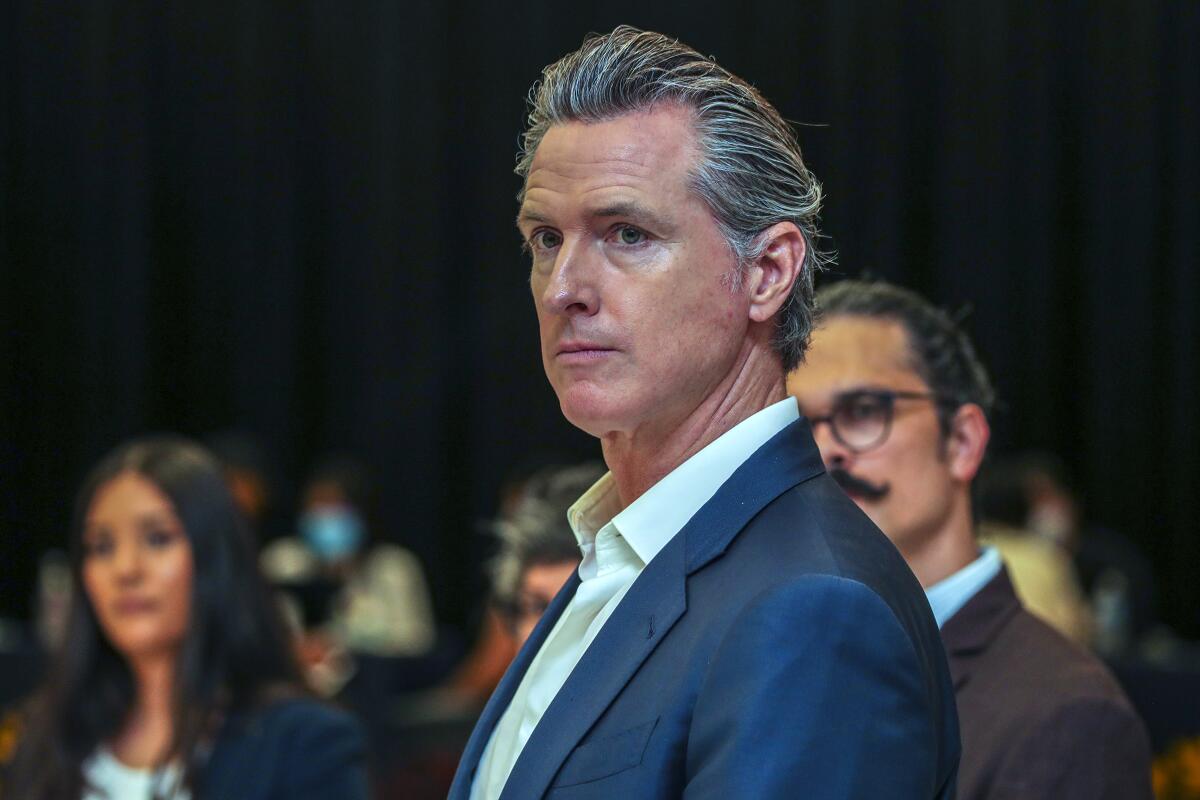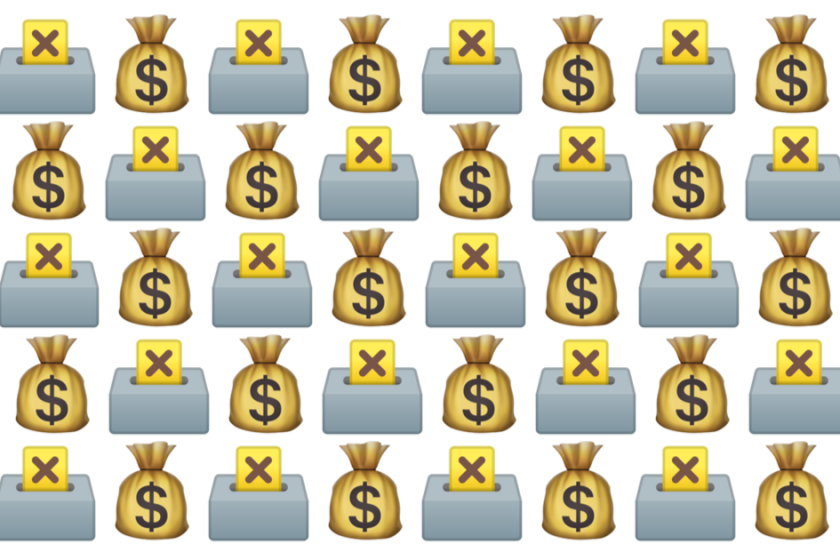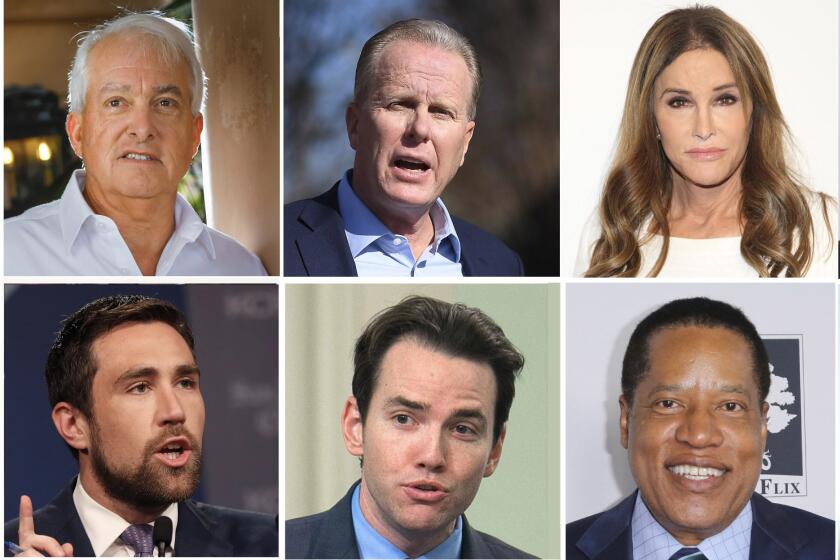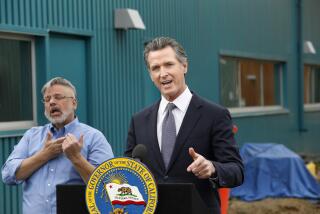Newsom and his allies raise tens of millions more than recall backers and GOP candidates

- Share via
Gov. Gavin Newsom and his allies have raised more than $51 million to fight the attempt to recall him, more than twice as much as every major Republican candidate and pro-recall committee combined, according to new fundraising disclosure reports.
The numbers crystallize the enormous financial advantage Newsom enjoys. Democrats said that the financial backing is evidence of Californians’ deep support of Newsom, and that they have the resources necessary to win the Sept. 14 election.
“We have donors from every state. We have more than 100 donors in every California congressional district,” said Nathan Click, spokesman for the main anti-recall committee. “It just goes to show that Democrats are energized, and we’re looking to translate that from our donors to the ballot box.”
Pro-recall committees, which have raised $6 million, counter that Newsom’s overwhelming financial advantage will not ultimately matter because Californians are increasingly recognizing that his policies, such as homelessness and wildfire preparation, are not working.
“When someone is not on the right side of the issues, they can spend all they want and it doesn’t matter,” said Anne Hyde Dunsmore, campaign manager for Rescue California, one of the main recall proponents. She said the anti-recall forces spent more than $10 million on television ads shortly before new polling showed that Newsom’s standing was more precarious than previously believed. “We haven’t spent a dime and he’s tanking.”
The data behind the money raised this year are drawn from semiannual fundraising disclosures filed with the California secretary of state’s office Monday as well as documentation of donations exceeding $1,000 that must be filed within 24 hours of their receipt. The reports cover donations to committees that support and oppose the recall, which can accept unlimited sums, as well as the candidates’ 2021 and 2022 campaign committees, which can accept up to $32,400 per donor per election (the recall election in September, and the primary and general elections next year). For candidates who have both 2021 and 2022 accounts, some money may not be spent in the recall election to avoid violating donor limits.
The fundraising disclosures come at a key juncture in the race:
New polling shows that Newsom is more vulnerable than once expected — not because Californians overwhelmingly want to oust the governor, but because the voters most enthusiastic about casting ballots are nearly evenly split on whether to recall him.
At least four of the top GOP candidates will meet for their first televised debate Wednesday, and then the state Republican Party will vote on whether to endorse a candidate Saturday. Four candidates gathered the required number of delegate signatures to qualify for the endorsement — talk radio host Larry Elder, Assemblyman Kevin Kiley, former San Diego Mayor Kevin Faulconer and former Rep. Doug Ose.
Nine days later, election officials will start sending mail ballots to all registered voters in California as required by a 2020 law prompted by the pandemic.
This is what voters need to know about the Sept. 14 recall election.
Among Republicans, businessman John Cox has raised the most money, $8.8 million, in his 2021 and 2022 gubernatorial accounts. Cox, the unsuccessful 2018 GOP gubernatorial nominee, has largely self-funded his bid, putting in $7.6 million of his own money.
Much of that money was spent on television ads for Cox’s “Beauty and the Beast” campaign stunt that included traveling the state with a 1,000-pound Kodiak bear named Tagg and framed the Republican as an aggressive animal who could tackle the state’s problems, and Newsom as a pretty boy.
Faulconer has raised $3.4 million in his 2021 and 2022 accounts, the next largest amount. He is viewed as the establishment favorite. But he raised that sum over six months, while new contestant Elder raised more than $1 million in the three weeks after he declared his candidacy.
Olympian-turned-reality-television star Caitlyn Jenner, a Republican who caused a major media splash when she entered the race but has failed to gain traction, reported bringing in a little more than $750,000. Also raising six figures were Ose, state Board of Equalization member Ted Gaines and Kiley, all Republicans; Riverside County Supervisor Jeff Hewitt, a Libertarian, and personal finance influencer Kevin Paffrath, Democrat.
A handful of the candidates have created pro-recall committees that can raise unlimited funds, but there appears to be little interest in these efforts. They have reported contributions of less than $250,000 combined.
The pro-recall committees that are not aligned with a candidate have raised $5.8 million, almost all of which was spent during their signature-gathering effort.
All of this pales in comparison with Newsom, who took in $3.8 million this year and had $23.3 million cash on hand as of June 30 in his 2022 reelection account, and the main anti-recall committee, which has raised $44.7 million and had $17.1 million in the bank as of June 30. Other anti-recall efforts sponsored by groups such as labor and the Democratic Governors Assn. have raised an additional $2.5 million.
Large amounts of pro-Newsom and anti-recall money came from organizations with business in front of the governor, such as labor.
Various Service Employees International Union committees have contributed more than $5 million to the primary anti-recall committee alone. Donors tied to healthcare, tribes, Silicon Valley, real estate and agriculture have given millions more.
The largest individual donor is Netflix founder Reed Hastings, who contributed $3 million to the anti-recall committee. (He and his wife also chipped in $64,000 each to Newsom’s reelection account.)
Their donations are notable because Hastings spent more than $7 million along with other charter backers opposing Newsom in the 2018 gubernatorial primary. (Once Newsom won the primary, Hastings backed him.)
Powerful San Francisco families who have supported Newsom since his early days have also remained involved, donating at least $1.6 million to the anti-recall effort and Newsom’s campaign.
Gavin Newsom wasn’t born rich, but he was born connected — and those alliances have paid handsome dividends throughout his career.
The bulk of the Democratic expenditures was spent on television and digital ads.
For many of the donors to the anti-recall effort, the expenditures are efforts to curry favor. Governors of both parties have counted on their longtime benefactors to fund ballot measures and other committees that can accept unlimited donations. But in this instance, Newsom’s allies may have to put the bulk of the money to work to ensure he stays in office.
“Basically, this is a do-or-die situation,” said Raphael J. Sonenshein, executive director of the Pat Brown Institute for Public Affairs at Cal State Los Angeles. “This is not something where you’re thinking how much can I hold onto to the next election.”
Although the funding gives Newsom an important edge, he said, it doesn’t give a lock on the election.
“It’s always better to have money than to not have money,” Sonenshein said. “But it’s not a guarantee in politics. Money doesn’t buy what it used to buy.”
More to Read
Get the L.A. Times Politics newsletter
Deeply reported insights into legislation, politics and policy from Sacramento, Washington and beyond. In your inbox twice per week.
You may occasionally receive promotional content from the Los Angeles Times.














